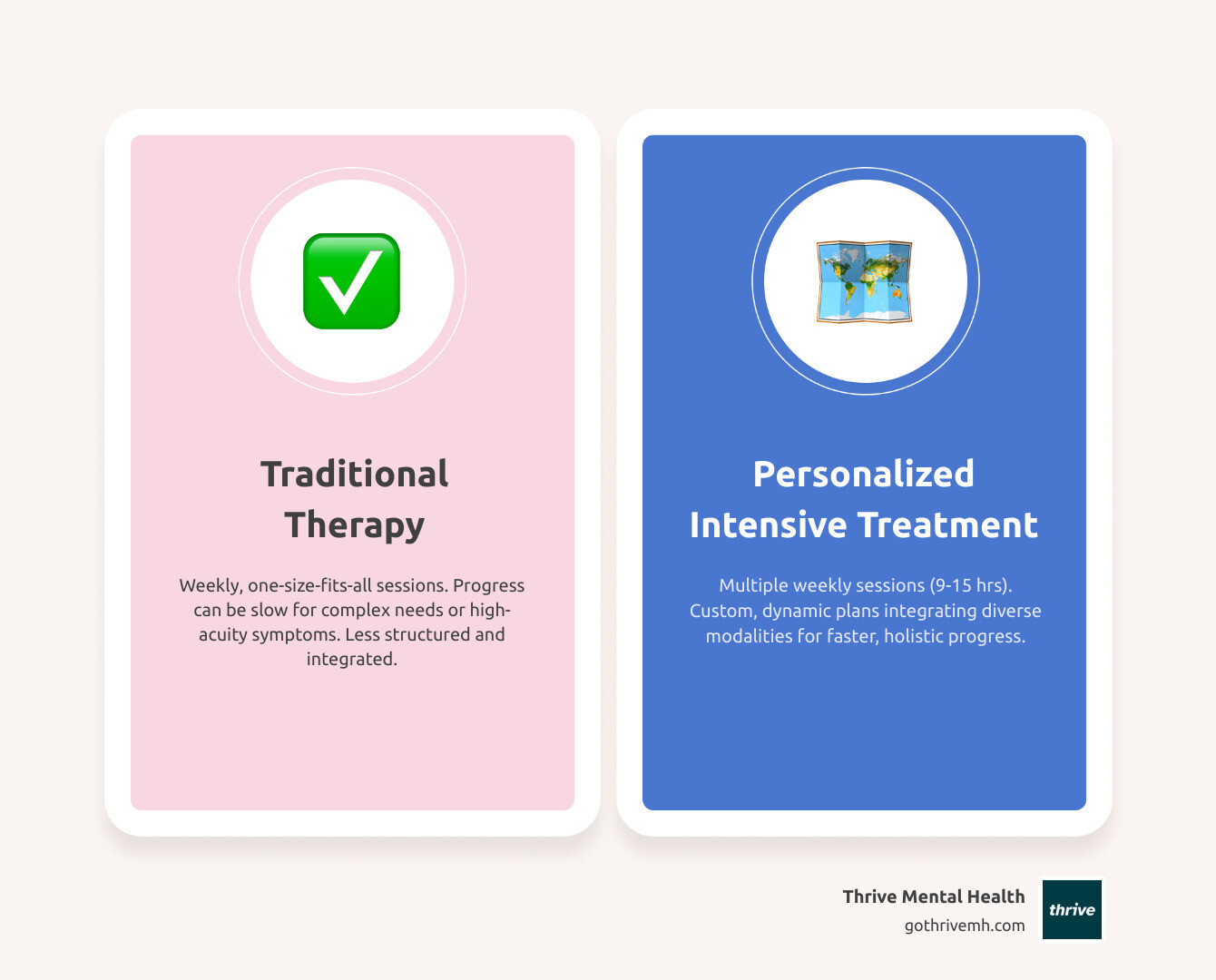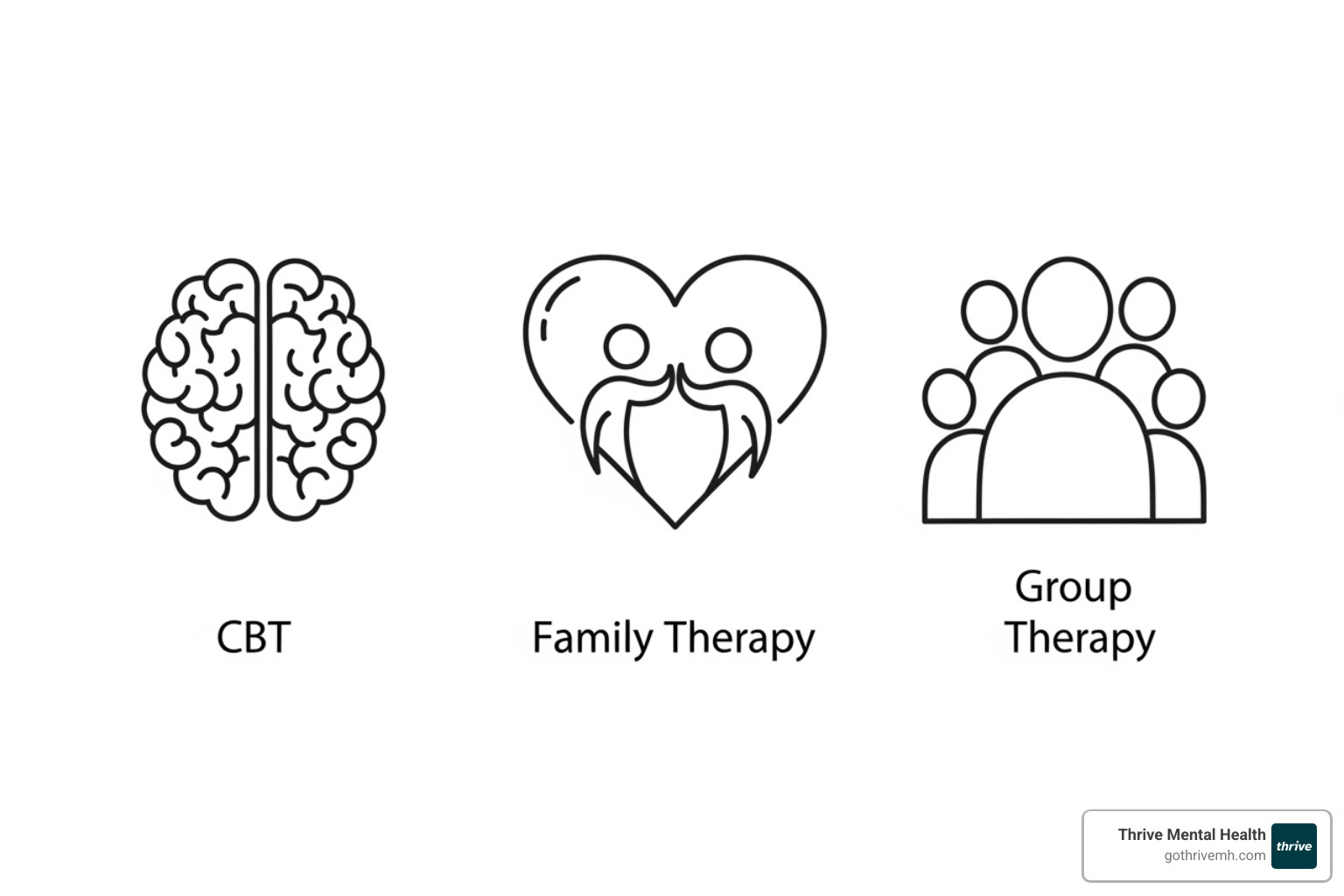Custom Care for Complex Needs: Understanding Personalized Intensive Treatment

Personalized Intensive Treatment: 91% Success
When Standard Therapy Isn’t Enough: Why Personalized Intensive Treatment Might Be Your Next Step
You’re doing the work in therapy, but progress feels slow. Maybe your symptoms are too intense for one hour a week, or you need a bridge back to daily life after a higher level of care. This is where Personalized Intensive Treatment makes a difference.
It’s a higher level of care that combines 9-15 hours of therapy per week with evidence-based interventions custom to your specific needs. Unlike once-weekly therapy, it offers:
- Intensive Scheduling: Multiple group, individual, and family sessions each week.
- Custom Plans: Treatment is developed collaboratively based on your unique history and goals.
- Flexible Formats: Available virtually across Florida or in-person to fit your life.
- Faster Progress: Designed for those needing more support than weekly therapy but not inpatient care.
This approach isn’t about failure; it’s about matching the level of care to the complexity of your needs. When you’re dealing with high-acuity symptoms or co-occurring conditions, you need a more responsive and structured approach.
I’m Anna Green, LMHC, LPC, Chief Clinical Officer at Thrive. With over a decade of experience in Personalized Intensive Treatment, I’ve led the development of our virtual-first intensive outpatient (IOP) and partial hospitalization (PHP) programs. We were among the first to earn Joint Commission telehealth accreditation, proving that customized, intensive care can be delivered effectively online to residents across Florida.
This guide explains what personalized intensive treatment is, who it’s for, and how to access it, so you can decide if it’s your right next step.

Handy Personalized Intensive Treatment terms:
What is Personalized Intensive Treatment and How Does It Differ?
Personalized Intensive Treatment is a step between weekly therapy and 24/7 hospital care. It’s for people who need more than one hour a week but are stable enough to live at home.
The “intensive” part refers to the time commitment: 9 to 15 hours of therapy per week, including group, individual, and family sessions. This structure creates momentum, helping you build skills faster and get immediate support. Most programs last 9 to 12 weeks, with the timeline adjusted to your needs.
The “personalized” part means your treatment plan is built around you—your specific struggles, background, and goals. Whether you’re a young professional, part of the LGBTQIA+ community, or a new parent, these details shape your care. You are an active collaborator in your treatment, not a passive recipient. For a closer look at how these programs are structured, check out more info about what an IOP is.

How a Personalized Intensive Treatment Plan is Developed
Your plan begins with a comprehensive assessment of your medical history, psychological profile, lifestyle, and relationships. We look for root causes, including family history, environmental stressors, or past trauma, to identify which evidence-based therapies will be most effective for you.
Next, we work with you to set clear, measurable, and time-bound goals. Instead of a vague wish to “feel better,” we target concrete outcomes like “reduce panic attacks from daily to once a week.” Your values drive this process.
Most importantly, these plans are dynamic. We continuously monitor your progress and adjust treatment as you heal. If something isn’t working, we pivot. Your plan evolves with you, considering your age, symptoms, and lived experience to ensure the therapeutic approach resonates.
Traditional Therapy vs. Intensive Personalized Care
Traditional weekly therapy is a powerful tool, but it’s different from intensive care. Here’s a side-by-side comparison:
| Feature | Traditional Therapy | Personalized Intensive Treatment |
|---|---|---|
| Frequency | Typically 1 session per week | Multiple sessions weekly: 3-5 group, 1+ individual, 1 family |
| Duration | Ongoing, often months to years | Structured 9-12 weeks, adjusted to your progress |
| Structure | Less structured, issue-focused over time | Highly structured, comprehensive program with multiple modalities |
| Customization | Personalized within each session | Entire program custom to your struggles, age, and lived experience |
| Support System | Limited direct family involvement | Active family/support integration through dedicated sessions |
| Pace of Progress | Gradual, steady improvement | Accelerated progress through intensive, coordinated approach |
| Level of Care | Best for stable symptoms or maintenance | Ideal for high-acuity needs, co-occurring disorders, or step-down care |
Research shows that personalized interventions produce better outcomes than one-size-fits-all approaches. When treatment is custom to who you are, you’re more likely to see meaningful change. You can read more about the science behind personalized interventions.
The bottom line: traditional therapy is maintenance. Personalized Intensive Treatment is designed for accelerated change when you need more support.
Who is the Ideal Candidate and What Conditions Are Treated?
Personalized Intensive Treatment is for those who sense they need something more. It’s ideal for individuals who need more structure than weekly therapy but don’t require 24/7 inpatient supervision. You’re stable enough to live at home but struggling enough that you need focused intervention to get back on track. A supportive home environment is helpful, giving you a safe place to practice new skills.

Common Conditions Addressed
Our programs are designed for high-acuity, complex mental health conditions that don’t respond to cookie-cutter approaches. We commonly treat:
- Depression: Major depression, persistent depressive disorder, and others. 93% of our clients report meaningful symptom improvement.
- Anxiety Disorders: Generalized anxiety, social anxiety, and panic disorder. 90% of clients report symptom improvements.
- Trauma and PTSD: Acute, chronic, or complex trauma.
- Substance Use Disorders: Addressed as behavioral health issues often rooted in trauma.
- Eating Disorders: Nutrition-inclusive care for anorexia, bulimia, and binge eating disorder in select states.
- Mood Disorders: Bipolar I and II, and others.
- OCD and Personality Disorders (e.g., borderline, narcissistic).
- Other Conditions: Dissociative disorders, gender dysphoria, neurodivergence (ADHD), and perinatal mood disorders.
We focus on the whole picture to build a path to lasting healing. For more on why professional support matters, explore the benefits of utilizing mental health services.
Treating Self-Harm and Suicidal Ideation
Crisis Disclaimer Callout Box:
If you or a loved one are in crisis or considering self-harm, please call or text 988 immediately to connect with the Suicide & Crisis Lifeline. You are not alone, and help is available 24/7.
If you struggle with self-harm or suicidal thoughts, this level of care provides the safety and support you need. We use specialized protocols for safety planning and provide 24/7 crisis support between sessions. The focus is on significant symptom reduction—89% of clients in similar programs report improvements in self-harm behaviors. We work intensively to build coping skills, equipping you with lifelong tools to manage distress safely.
Differences Across Age Groups
Treatment is custom to your life stage.
For adolescents, family involvement is central to success. Parents participate in therapy and learn how to support their teen at home. The program is structured around school and peer dynamics. You can learn more about adolescent IOPs to see how this works.
For adults and young professionals, the focus is on balancing treatment with work and life responsibilities. Our flexible scheduling, including evening options, is ideal for Florida’s diverse workforce, allowing you to prioritize your mental health without pausing your career. The emphasis is on building independent coping skills and support networks.
The Building Blocks of a Custom Care Plan
The power of Personalized Intensive Treatment lies in its integrated care model. Your therapist, psychiatrist, and case manager work together as a multidisciplinary team, ensuring everyone is on the same page. This holistic, whole-person approach considers how your mental health connects to all aspects of your life, aiming for long-term healing, not just symptom relief.

Core Therapeutic Modalities
Your care plan is built from several core components:
- Individual Therapy: At least one weekly one-on-one session to process personal challenges and develop coping strategies.
- Group Therapy: The heart of the program (around nine hours weekly), where you connect with peers, learn from shared experiences, and realize you’re not alone.
- Family Therapy: Weekly sessions, when appropriate, to improve communication and help loved ones learn how to support you effectively.
- Psychiatric Services: Optional medication management is available to ensure you receive comprehensive care, combining therapy with medication when needed.
For more on how these fit together, explore a guide to intensive outpatient programs.
Evidence-Based Therapies Used in Personalized Intensive Treatment
We use therapies proven effective by research, custom to your specific needs:
- Cognitive Behavioral Therapy (CBT): Helps you identify and change negative thought patterns that fuel anxiety and depression.
- Dialectical Behavior Therapy (DBT): Teaches skills for mindfulness, emotion regulation, and distress tolerance, ideal for intense emotional swings and personality disorders.
- Exposure and Response Prevention (ERP): The gold standard for OCD, it involves gradually facing triggers while resisting compulsions.
- EMDR (Eye Movement Desensitization and Reprocessing): A specialized therapy that helps the brain process traumatic memories to reduce their emotional impact.
- Somatic Experiencing: A body-focused approach to release stress and trauma stored in the nervous system.
By drawing from these gold-standard therapies, we build a treatment plan that is specific to you.
The Role of Family and Support Systems
Healing doesn’t happen in a vacuum. We actively involve your support system through family therapy and education. We teach loved ones how to provide effective support, recognize warning signs, and create a healthy home environment. Research shows family involvement is a leading predictor of success in intensive outpatient programs, as it helps reinforce your progress and prevent relapse.
Accessing Care: Virtual Programs, Costs, and Provider Choice
Getting the right intensive care shouldn’t be another source of stress. Personalized Intensive Treatment has evolved to overcome traditional barriers like distance and scheduling conflicts, making high-quality care more accessible than ever, whether in-person or online.
How Virtual Personalized Intensive Treatment Works
Virtual programs have changed who can access intensive care. You can receive comprehensive individual, group, and family therapy from the safety of your own home through secure, HIPAA-compliant telehealth platforms.
The key benefits are:
- Flexible Scheduling: Evening options allow you to attend after work or school, so you don’t have to pause your life for treatment.
- No Commute: You attend sessions, close your laptop, and you’re already home, saving time and energy.
- Real-World Application: You can practice new coping skills in your actual environment, making the transition from therapy to life seamless.
Research and real-world results confirm that the therapeutic connection is just as powerful through a screen. To see how it works, you can explore virtual IOP programs.
Insurance and Cost Considerations
Wondering if you can afford treatment shouldn’t stop you from getting help. Most intensive outpatient (IOP) and partial hospitalization (PHP) programs are covered at least in part by insurance. At Thrive, we are in-network with most major providers, including Cigna, Aetna, Florida Blue, and Optum. Specific coverage, such as Medicaid for IOP, may be available in states like Florida.
Your first step is to verify your coverage. Our Admissions Team can review your benefits, usually within 24 hours, so you know your costs upfront with no obligation. Many clients find their out-of-pocket expenses are manageable. For more context, this guide to virtual IOP in South Florida offers helpful insights.
What Differentiates Treatment Providers?
Not all intensive programs are the same. When choosing a provider, look for these key features:
- True Personalization: Your treatment plan should be built from the ground up for you, not a one-size-fits-all template.
- Clinician Expertise: Therapists should be highly skilled in the specific modalities you need, like ERP for OCD or EMDR for trauma.
- Range of Modalities: A provider offering CBT, DBT, EMDR, and more can truly tailor your care.
- Accreditation and Outcomes: Look for The Joint Commission accreditation, a sign of high standards. At Thrive, 91% of clients see improvements, and 83% achieve significant symptom reduction.
- Flexible Options: The best providers offer virtual programs accessible to all Floridians, as well as in-person and hybrid formats to fit your life.
- Specialized Programming: Look for programs that understand the unique needs of specific communities (e.g., LGBTQIA+, BIPOC, maternal mental health).
Our guide on finding quality IOP programs can help you ask the right questions.
Frequently Asked Questions about Personalized Intensive Treatment
What does a typical week in an intensive program look like?
A typical week involves 9-15 hours of therapy, broken down into a manageable schedule. This usually includes three to five group therapy sessions, at least one individual session, and one family therapy session when appropriate. We offer flexible scheduling, including evening options, to fit around your work or school commitments. You also have access to 24/7 crisis support between sessions.
How long does a personalized intensive treatment program last?
Most programs last between 9 to 12 weeks, but the timeline is personalized. Your duration depends on your individual progress and treatment goals, which are reviewed regularly with your therapist. The decision to step down to a lower level of care is made collaboratively when you are ready.
Is virtual intensive treatment as effective as in-person?
Yes. Research and clinical outcomes consistently show that virtual intensive outpatient programs (IOPs) are just as effective as in-person care. At Thrive, more than 91% of clients see improvements in their most severe symptoms through our virtual programs. The quality of the program and the expertise of the clinicians are what determine effectiveness, not the location. Virtual care also removes barriers like travel and scheduling conflicts, making it a powerful and accessible path to healing.
Your Path to Custom Healing
We’ve explored how Personalized Intensive Treatment offers a responsive, effective alternative when weekly therapy isn’t enough. It’s care that sees you as a whole person, not a diagnosis, and bends to fit your life.
This approach provides intensive support to match the intensity of what you’re facing—whether it’s complex trauma, anxiety, depression, or co-occurring conditions. Through custom plans, evidence-based therapies, and flexible virtual options, every element is designed to accelerate real, lasting change.
If you’re in Florida and feel stuck, know that it’s brave to seek a higher level of support. There is hope for deeper healing that doesn’t just manage symptoms but helps you build a resilient, meaningful life. Your path to custom healing starts with a single step.
Ready for support? Thrive offers virtual and hybrid IOP/PHP with evening options designed to fit around your life in Florida. Verify your insurance in 2 minutes (no obligation) → Start your journey with our intensive outpatient programs or call 561-203-6085. If you’re in crisis right now, please call or text 988—you are not alone, and help is available 24/7.